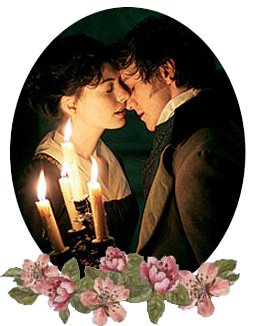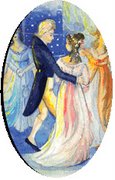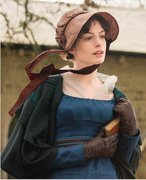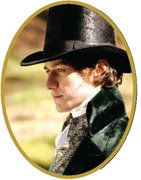Debate this! Jane Austen's Characters & the 21st Century
 I opened my Fiction Study Guide this morning, to begin work for Semester Two, and this is what I read:
I opened my Fiction Study Guide this morning, to begin work for Semester Two, and this is what I read:
 I opened my Fiction Study Guide this morning, to begin work for Semester Two, and this is what I read:
I opened my Fiction Study Guide this morning, to begin work for Semester Two, and this is what I read:
Posted by
Anonymous
at
06:47
![]()
Labels: Austen's books




We are rolling a petition to reprint Nadia Radovici’s 1995 book titled ‘A Youthful Love: Jane Austen & Tom Lefroy?’ that is currently out of print. Please sign for the Radovici's Jane Austen & Tom Lefroy Petition and spread the words! Thanks a lot!



Jane Austen was born on

Cast:
Anne Hathaway - Jane Austen
James McAvoy - Tom Lefroy
Julie Walters - Mrs. Austen
James Cromwell - Revd. George Austen (Jane's father)
Maggie Smith - Lady Gresham
Anna Maxwell Martin - Cassandra Austen
Joe Anderson - Henry Austen
Lucy Cohu - Eliza de Feullide
Laurence Fox - Mr. Wisley
Philip Culhane - George Austen (Jane's brother)
Ian Richardson – Judge Langlois
Leo Bill – John Warren
Jessica Ashworth – Lucy Lefroy
Eleanor Methven – Mrs. Lefroy
Michael James Ford – Mr. Lefroy
Sophie Vavasseur – Jane Lefroy
Helen McCrory – Ann Radcliffe
Julian Jarrold - Director
Graham Broadbent, Robert Bernstein, & Douglas Rae - Producer
Adrian Johnston - Soundtrack
Kevin Hood & Sarah Williams - Screenplay writers
Eigil Bryld - Cinematography
Jane Gibson - Choreography
Eimer Ni Mhaoldomhnaigh - Costume
Gail Stevens & Gillian Reynolds - Casting




Jon Spence,


McAvoy knew his portrait of Tom could only come alive with the right Jane, and he found Anne Hathaway almost supernaturally suited for the part. “I don’t think we could have chosen anyone better to play Jane Austen," he says.

Jane Austen’s greatest love story was her own













‘I’m yours, Jane, heart and soul!’
~ Tom Lefroy to Jane Austen, ‘Becoming Jane’

Anything is to be preferred or endured rather than marrying without affection – JA,

Nothing can be compared to the misery of being bound without Love, bound to one, & preferring another – JA,



To be so bent on marriage, to pursue a man merely for the sake of situation – is a sort of thing that shocks me.





The film Becoming Jane has given us an image of Jane Austen that liberates our imagination. I envy readers of my book who come to it with Anne Hathaway’s image of Jane in their mind’s eye. You will not have to struggle against the image Cassandra created to see the Jane Austen who was young and pretty, lively and in love. Anne Hathaway’s skilful portrayal of Jane Austen in Becoming Jane shows that art can have as much power to bring us closer to the truth as facts themselves can.
Jon Spence,
6 comments:
Okay, I'll stick my neck out first. The author may have a (small) point, but my opinion is goes a bit further. Yes, it is nice to have a bit of Regency lore to understand some of the details. What I have found is that the characters are just the same today as then. I can identify with so many of them. The author does not differentiate as I do and s/he lumps the work in one pot. You can't, or shouldn't, do that, especially to Jane.
Linda the Librarian
Michelle, let me go one step further. I have been collecting and briefly reading the things that Jane might possibly have read, such as Johnson, Addison, Steele, etc. who wrote almost 100 years before she did. Those writers were talking about human nature and their characters were just as "human" as Jane's were. That is where she got it from. People, meaning human nature. is/are timeless. So we are in total agreement. 'Nuff said.
Linda the Librarian
I haven't even read Faulkner... Perhaps it is time? But I do agree with JA's characters being timeless. Of course everybody has different historical baggage, but it is not needed for understanding the brilliance of JA. I have been trying not to analyze too much since I finished (well, apart from my paper which is still due, anytime now... perhaps when I'm on maternity leave?) school. I want to read just to enjoy the book itself. But I find I'm still analyzing, automatically... damn it! ;)
Me and Peanut are fine. In week 15 now. Time flies...
/hugs and kisses, Maria and Peanut
ps. Part 31 (1) of I remember Love is up.
there should be and "!" instead of the "1"...
Of course he has a point but I feel he has misconstued his own point! As Michelle rightly said, you can appreciate the subtle nuances of a text if you have some background and knowledge of the historical and cultural context. He is saying, however, that you should only focus on reading novels with a context that you are comfortable and familiar with- what poppycock! How are we going to expand our breadth in literary knowledge without familiarising ourselves with a variety of novels and a variety of time periods? I think that only when we have done that can we really learn how the text works as a fiction...its all about comparing and contrasting which leads to us having a desire to read and learn more...
I am waffling, I hope you understand what I am saying. I think, in my opinion, that this is a very ignorant paragraph.
Man o man... sorry that I skipped this one Michelle, you posted it during my hectic field days. Anyway, since I'm going back to the field the morrow afternoon, and hence will be lost in traffic, I will try to offer my opinion, albeit belatedly.
To read someone like Jane Austen, for instance, ideally you would need to know something about Regency England and its world view.
I will stick my neck out and brace myself, daring to be different :-D from my fellow posters and fellow Team Jane.
I somewhat agree with the author of that passage. See it from my viewpoint as an Asian woman who knew next to nothing about Jane Austen before the launching of Becoming Jane (one more thing to kill me virtually). At that time, I can pick an Asian book easily, say Musashi(Japan), the Hungry Tide (India), or Senopati Pamungkas (Indonesia) and follow the stories pretty easily.
Why? Because I know the cultures where those writers came from. On the other hand, my dear ladies here might have hard time to grasp the Samurai soul in Musashi, or how an Indian cetologist like dwelling in a mangrove area of Sundarban, with lots of mosquitos. Or Indonesia during the reign of Majapahit Kingdom, more than 5 centuries ago.
I will give you another book that will be even harder to grasp: Taj, telling the story of the founder of Taj Mahal in India. To enjoy it, one must understand India, the Moghul Dynasty in India, and so on and so forth. Or at least, willing to learn about it.
As for Jane, it took me a while to understand her dictions and style, because I was not familiar with the Regency World. Over the time, of course I could enjoy it, but not without first striving to understand their meanings. Hence Penguin and Oxford editions are dear to me, for they provide historical background of a passage.
I find it odd to be different with you ladies, but here's my true heart speaking. Yes, it takes a while for Asians (who never touched Austen before) to understand Jane's language... but once we're in, we're hooked.
That's the power of Jane Austen. To keep readers attached to them. But for some readers, it does not come easily, particularly due to language and cultural 'barriers'.
Just my two cents.
Post a Comment